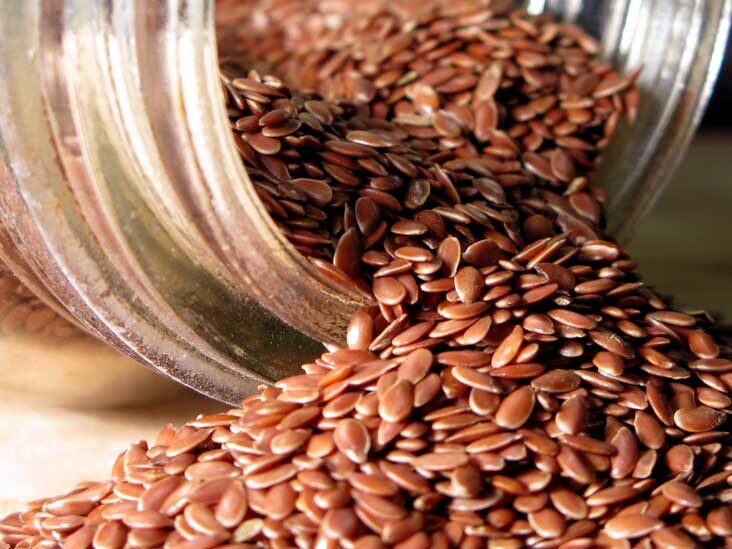
Nowadays, flax seeds are emerging as a “very food” as more clinical research indicate their health advantages.
1. Flax Seeds Are Loaded With Nutrients
Grown considering that the beginning of civilization, flax seeds are one of the earliest crops. There are 2 types, brown and golden, which are equally healthy.
A typical serving size for ground flax seeds is 1 tablespoon (7 grams).
Just one tablespoon supplies a good amount of protein, fiber and omega-3 fats, in addition to being a rich source of some minerals and vitamins.
One tablespoon of ground flax seeds includes the following:
- Calories: 37
- Protein: 1.3 grams
- Carbohydrates: 2 grams
- Fiber: 1.9 grams
- Total fat: 3 grams
- Hydrogenated fat: 0.3 grams
- Monounsaturated fat: 0.5 grams
- Polyunsaturated fat: 2.0 grams
- Omega-3 fats: 1,597 mg
- Vitamin B1: 8% of the RDI
- Vitamin B6: 2% of the RDI
- Folate: 2% of the RDI
- Calcium: 2% of the RDI
- Iron: 2% of the RDI
- Magnesium: 7% of the RDI
- Phosphorus: 4% of the RDI
- Potassium: 2% of the RDI
Surprisingly, flax seeds’ health benefits are primarily attributed to the omega-3 fats, lignans and fiber they consist of.
SUMMARY:
Flax seeds are good sources of numerous nutrients. Their health benefits are generally due to their material of omega-3 fats, lignans and fiber.
2. Flax Seeds Are High in Omega-3 Fats
If you are a vegetarian or don’t eat fish, flax seeds can be your best source of omega-3 fats.
They are an abundant source of alpha-linolenic acid (ALA), a mainly plant-based omega-3 fat.
ALA is among the two necessary fatty acids that you have to acquire from the food you consume, as your body does not produce them.
Animal studies have actually shown that the ALA in flax seeds prevented cholesterol from being transferred in the blood vessels of the heart, lowered swelling in the arteries and minimized tumor growth.
A Costa Rican study including 3,638 people discovered that those who consumed more ALA had a lower danger of cardiac arrest than those who consumed less ALA (6Trusted Source).
Likewise, a large review of 27 research studies involving more than 250,000 individuals discovered that ALA was linked to a 14% lower threat of heart disease.
Various studies have likewise connected ALA to a lower danger of stroke.
Moreover, a current review of observational information concluded that ALA had heart health advantages similar to eicosapentaenoic acid (EPA) and docosahexaenoic acid (DHA), two of the more popular omega-3 fats.
SUMMARY:
Flax seeds are a rich source of the omega-3 fatty acid ALA. Plant-based ALA fats are proven to have heart health benefits and are linked to a lower risk of stroke.
3. Flax Seeds Are a Rich Source of Lignans, Which May Reduce Cancer Threat
Lignans are plant substances that have antioxidant and estrogen residential or commercial properties, both of which can assist reduce the threat of cancer and enhance health.
Interestingly, flax seeds include up to 800 times more lignans than other plant foods.
Observational studies reveal that those who eat flax seeds have a lower danger of breast cancer, especially postmenopausal females.
Additionally, according to a Canadian research study including more than 6,000 females, those who eat flax seeds are 18% less likely to establish breast cancer.
Men can also benefit from eating flax seeds.
In a small research study consisting of 15 males, those given 30 grams of flax seeds a day while following a low-fat diet revealed reduced levels of a prostate cancer marker, suggesting a lower risk of prostate cancer.
Flax seeds likewise appeared to have the prospective to prevent colon and skin cancers in laboratory and animal research studies. More research study is needed to verify this.
However, the proof so far indicates flax seeds being a potentially important food in the battle against various cancers.
SUMMARY:
Flax seeds consist of a group of nutrients called lignans, which have powerful antioxidant and estrogen properties. They might help in avoiding breast and prostate cancer, in addition to other types of cancer.
4. Flax Seeds Are Abundant in Dietary Fiber
Simply one tablespoon of flax seeds consists of 3 grams of fiber, which is 8 – 12% of the everyday advised consumption for men and women, respectively.
What’s more, flax seeds contain 2 kinds of dietary fiber – soluble (20 – 40%) and insoluble (60 – 80%).
This fiber duo gets fermented by the bacteria in the large bowel, bulks up stools and results in more regular bowel movements.
On one hand, soluble fiber increases the consistency of the contents of your intestinal tract and slows down your food digestion rate. This has actually been shown to help control blood sugar level and lower cholesterol.
On the other hand, insoluble fiber allows more water to bind to the stools, increases their bulk and leads to softer stools. This works for preventing constipation and for those who have irritable bowel syndrome or diverticular disease.
SUMMARY:
With a lot fiber packed in each small seed, adding flax seeds to your diet promotes routine defecation and can enhance your gastrointestinal health.
5. Flax Seeds May Improve Cholesterol
Another health advantage of flax seeds is their capability to lower cholesterol levels.
In one study in individuals with high cholesterol, taking in 3 tablespoons (30 grams) of flaxseed powder daily for three months lowered overall cholesterol by 17% and “bad” LDL cholesterol by nearly 20%.
Another study of people with diabetes discovered that taking 1 tablespoon (10 grams) of flaxseed powder daily for one month resulted in a 12% increase in “great” HDL cholesterol.
In postmenopausal females, consuming 30 grams of flax seeds day-to-day reduced total cholesterol and LDL cholesterol by roughly 7% and 10%, respectively.
These results seem due to the fiber in flax seeds, as it binds to bile salts and is then excreted by the body.
To replenish these bile salts, cholesterol is pulled from your blood into your liver. This process lowers your blood levels of cholesterol.
This is certainly great news for those wanting to enhance their cholesterol.
SUMMARY:
The high fiber material of flax seeds can assist lower cholesterol and may play an important function in enhancing heart health.
6. Flax Seeds May Lower High Blood Pressure
Research studies on flax seeds have actually likewise focused on its natural ability to lower high blood pressure.
A Canadian research study discovered eating 30 grams of flax seeds daily for six months decreased systolic and diastolic blood pressure by 10 mmHg and 7 mmHg, respectively.
For those who were already taking blood pressure medication, flax seeds reduced high blood pressure even further and decreased the number of patients with unchecked high blood pressure by 17%.
Moreover, according to a big review that took a look at data from 11 studies, taking flax seeds daily for more than three months lowered high blood pressure by 2 mmHg.
While that might seem insignificant, a 2-mmHg reduction in blood pressure can lower the threat of dying from stroke by 10% and from heart problem by 7%.
SUMMARY:
Flax seeds have been proven to lower blood pressure and are especially handy for those with hypertension.
7. They Contain Top Quality Protein
Flax seeds are a great source of plant-based protein, and there’s growing interest in flaxseed protein and its health benefits. Flaxseed protein is abundant in the amino acids arginine, aspartic acid and glutamic acid.
Numerous laboratory and animal studies have actually revealed that flaxseed protein assisted enhance immune function, reduced cholesterol, avoided growths and had anti-fungal properties.
If you are considering cutting down on meat and fretted that you will be too hungry, flax seeds may just be your answer.
In fact, in one recent research study, 21 adults were provided an animal protein meal or plant protein meal. The study discovered no distinction in terms of hunger, satiety or food consumption noted in between the two meals.
It’s likely both the animal and plant protein meals promoted hormones in the gut to cause the feeling of fullness, which led to consuming less at the next meal.
SUMMARY:
Flax seeds are a good source of plant-based protein and can be an alternative protein source for people who do not eat meat.
8. Flax Seeds May Assist Control Blood Sugar Level
Type 2 diabetes is a significant health problem worldwide.
It’s defined by high blood sugar level levels as a result of either the body’s failure to produce insulin or resistance to it.
A couple of studies have actually found that individuals with type 2 diabetes who added 10– 20 grams of flaxseed powder to their day-to-day diet for at least one month saw decreases of 8– 20% in blood sugar level levels.
This blood sugar-lowering result is notably due to flax seeds’ insoluble fiber material. Research has discovered that insoluble fiber slows down the release of sugar into the blood and decreases blood glucose.
Nevertheless, one study found no change in blood glucose levels or any improvement in diabetes management.
This might be due to the small numbers of topics in the research study and making use of flaxseed oil. Flaxseed oil lacks fiber, which is credited with flax seeds’ capability to lower blood sugar.
Overall, flax seeds can be a useful and healthy addition to the diet of people with diabetes.
SUMMARY:
Flax seeds might lower blood glucose due to their insoluble fiber content. They can be a beneficial addition to the diet plan of individuals with diabetes.
9. Flax Seeds Keep Cravings at Bay, Which May Aid Weight Control
If you have the tendency to treat between meals, you might want to think about adding flax seeds to your drink to stave off cravings pangs.
One study discovered that including 2.5 grams of ground flax fiber extract to a beverage decreased feelings of hunger and overall hunger.
The feelings of decreased cravings were likely due to the soluble fiber content of flax seeds. It slows digestion in the stomach, which activates a host of hormonal agents that control cravings and supply a sensation of fullness.
Flax seeds’ dietary fiber material may help weight control by reducing cravings and increasing feelings of fullness.
SUMMARY:
Flax seeds keep you complete for longer and might help you handle your weight by controlling your appetite.
10. Flax Seeds Can Be a Versatile Component
Flax seeds or flaxseed oil can be contributed to many typical foods. Try the following:
- Adding them to water and drinking it as part of your day-to-day fluid consumption
- Drizzling flaxseed oil as a dressing on salad
- Spraying ground flax seeds over your hot or cold breakfast cereal
- Blending them into your preferred yogurt
- Adding them into cookie, muffin, bread or other batters
- Mixing them into shakes to thicken up the consistency
- Adding them to water as an egg replacement
- Incorporating them into meat patties
SUMMARY:
Flax seeds are flexible can be easily added to your everyday diet plan. There are a range of recipes you can attempt.
Facebook Comments
